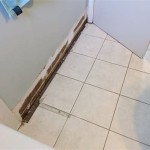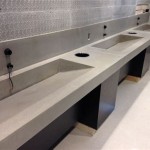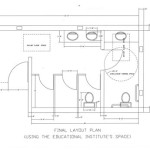What Is The Best Countertop To Use In A Bathroom Sink?
Selecting the ideal countertop for a bathroom sink involves careful consideration of factors such as durability, aesthetics, maintenance requirements, and budget. The bathroom environment, characterized by humidity and frequent water exposure, necessitates a material that can withstand these conditions without degrading or requiring excessive upkeep. This article examines several popular countertop materials, exploring their advantages and disadvantages to assist in making an informed decision.
Understanding Key Considerations
Before delving into specific materials, it is crucial to establish a framework of essential considerations. These factors serve as benchmarks against which each material can be evaluated, ensuring the selected countertop meets the specific needs and preferences of the user.
Moisture Resistance:
Bathroom countertops are constantly exposed to water, whether from handwashing, splashing, or condensation. A highly moisture-resistant material is crucial to prevent water damage, staining, and the growth of mold and mildew. Materials that are porous or prone to absorption are generally less suitable for bathroom applications without significant sealing and maintenance.Durability:
The countertop should be able to withstand daily use, including potential impacts from dropped items, scratches from cleaning tools, and prolonged exposure to various toiletries and cleaning agents. A durable material will maintain its appearance and structural integrity for a longer period, reducing the need for frequent replacements.Maintenance:
Different countertop materials require varying levels of maintenance. Some materials require regular sealing to maintain their water resistance, while others are inherently low-maintenance. Consider the time and effort required to keep the countertop clean and in good condition when making a selection. Certain cleaning products can also damage some materials, so understanding approved cleaning methods is important.Aesthetics:
The countertop plays a significant role in the overall aesthetic of the bathroom. The selected material should complement the existing design elements, such as the flooring, cabinetry, and fixtures. A wide range of colors, patterns, and textures are available, allowing for customization and personalization.Cost:
Countertop materials vary significantly in price, ranging from affordable laminates to high-end natural stones. Establishing a budget early in the selection process is essential to narrow down the options and avoid overspending. It’s important to factor in not only the material cost but also the installation cost, which can vary depending on the complexity of the project.Exploring Common Countertop Materials
Several materials are commonly used for bathroom countertops, each with its unique properties and characteristics. Understanding the strengths and weaknesses of each material is essential for making an informed decision.
Granite:
Granite is a natural stone renowned for its durability and aesthetic appeal. It is highly resistant to scratches, heat, and stains, making it a popular choice for both kitchen and bathroom countertops. Granite's natural variations in color and pattern create a unique and elegant look. However, granite is porous and requires regular sealing to prevent water absorption and staining. Sealing, typically done annually, can add to the maintenance requirement.Quartz:
Quartz countertops are engineered stone products composed of crushed quartz crystals mixed with resin. This combination results in a non-porous material that is highly resistant to stains, scratches, and bacteria. Quartz countertops are also available in a wide range of colors and patterns, including those that mimic natural stone. Because it's engineered, its consistency is more predictable than natural stone. This material is more consistent in appearance. Quartz is typically more expensive than laminate but less expensive than some high-end granite.Marble:
Marble is another natural stone prized for its luxurious appearance. Its veining patterns and smooth texture create a sophisticated and elegant look. However, marble is a relatively soft and porous material, making it susceptible to scratches, stains, and etching from acidic substances. Marble requires more diligent maintenance than granite or quartz, including frequent sealing and careful cleaning. It is often more expensive than granite and quartz. The maintenance is a critical consideration for bathrooms.Laminate:
Laminate countertops are constructed from layers of plastic laminate bonded to a particleboard core. Laminate is an affordable and versatile option, available in a wide range of colors and patterns. It is relatively easy to clean and maintain. However, laminate is not as durable as natural stone or quartz and is susceptible to scratches, dents, and water damage, especially at the seams. Damage often cannot be repaired, requiring replacement of the entire countertop. The edges are also susceptible to peeling.Solid Surface:
Solid surface countertops are made from a blend of acrylic or polyester resins and mineral fillers. They are non-porous, seamless, and repairable. Solid surface countertops are resistant to stains, scratches, and bacteria. They are available in a variety of colors and patterns, some of which mimic natural stone. Solid surface is another option that generally falls in the middle range of both cost and durability. While scratches can often be buffed out, it is more susceptible to heat damage than quartz or granite.Tile:
Tile countertops offer a wide range of design possibilities. Ceramic and porcelain tiles are durable, water-resistant, and easy to clean. However, the grout lines between tiles can be difficult to keep clean and may be susceptible to staining and mildew growth. Epoxy grout can help mitigate these issues. Tile can handle heat well, so curling irons or other hot items won't cause damage. The cost varies significantly depending on the selected tile.Concrete:
Concrete countertops offer a unique and industrial aesthetic. They can be customized with various colors, textures, and finishes. Concrete is durable but porous and requires sealing to prevent staining and water damage. Cracking is also a potential concern with concrete countertops. The weight of concrete is a factor that needs to be considered for cabinet support.Glass:
Glass countertops are visually striking and non-porous. They are resistant to stains and scratches, but can be susceptible to chipping or cracking from impact. Glass countertops can be translucent or opaque and can be customized with different colors and textures. They require specialized cleaning products to maintain their clarity and shine. The cost can be relatively high, and finding installers experienced with glass countertops might be limited in some areas.Evaluating Material Properties for Bathroom Use
To effectively compare the suitability of each material, a detailed evaluation of their properties in relation to the bathroom environment is necessary. This evaluation considers factors such as water resistance, durability, maintenance, and cost.
Water Resistance Comparison:
Quartz, solid surface, and glass offer superior water resistance due to their non-porous nature. Granite and concrete require regular sealing to maintain their water resistance. Marble and laminate are more susceptible to water damage if not properly maintained. Tile's water resistance relies heavily on the grout and the use of sealers or epoxy grout.Durability Comparison:
Granite and quartz are the most durable options, offering resistance to scratches, heat, and stains. Solid surface is also relatively durable and can be repaired if damaged. Marble is softer and more prone to scratches and etching. Laminate is the least durable option and is susceptible to scratches, dents, and water damage. Concrete can crack over time. Glass is susceptible to chipping, especially along the edges.Maintenance Comparison:
Quartz and solid surface are relatively low-maintenance options, requiring only regular cleaning with mild soap and water. Granite and marble require regular sealing to prevent staining. Laminate is easy to clean but can be difficult to repair if damaged. Tile requires regular cleaning of the grout lines to prevent staining and mildew growth. Concrete requires sealing and periodic reapplication. Glass requires specialized cleaning products to maintain its clarity.Cost Comparison:
Laminate is the most affordable option, followed by tile and solid surface. Granite and quartz are mid-range in price. Marble and glass are generally the most expensive options. Concrete costs vary depending on the complexity of the design and the specific finish applied.Ultimately, selecting the best countertop material requires weighing the various factors discussed above against specific needs, aesthetic preferences, and budgetary constraints. A material that excels in durability and water resistance may be prioritized for high-traffic bathrooms, while aesthetics may be the primary concern for guest bathrooms. Careful consideration of all aspects will facilitate a well-informed and satisfying decision.
:strip_icc()/101963997-428f882f0c604f7cb5e07f81516e96d9.jpg?strip=all)
18 Luxurious Bathroom Countertop Ideas For All Budgets

What Are The Best Surfaces For Bathroom Countertops

Choosing Bathroom Countertops Quartz Granite Or Marble

Blog Updated Best Performing Bathroom Countertops

15 Best Bathroom Countertop Ideas Sink Storage And Vanity
:strip_icc()/102227038-7f5a5ef7c99948bd817d94db91e36084.jpg?strip=all)
18 Luxurious Bathroom Countertop Ideas For All Budgets

Choosing The Right Bathroom Countertops Renovation Capital

Best Countertop Materials For The Bathroom Lx Hausys

12 Best Quartz Bathroom Countertops In 2024 Marble Com

12 Best Quartz Bathroom Countertops In 2024 Marble Com
Related Posts







